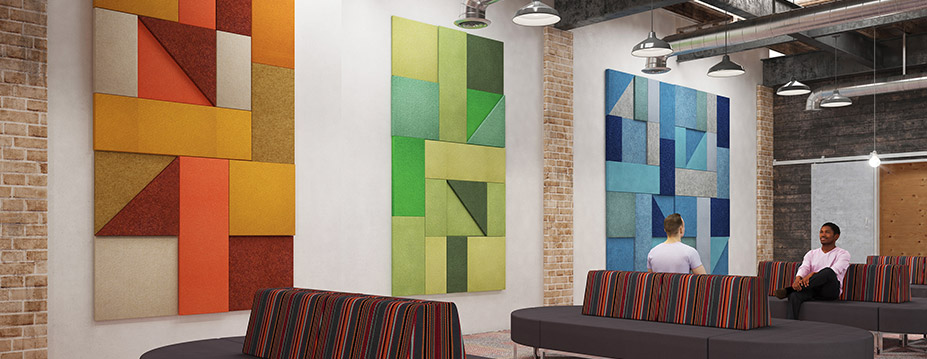The workplace has always been more than just a place to work, and to support their job, employees require a variety of environments that allow them to collaborate, concentrate, learn, socialise, work and relax. The right arrangement of people, processes and places will enhance the office aesthetics, improve employee wellbeing, increase cooperation and help facilitate decision-making business processes.

The most effective and modern office spaces are characterised by division into different zones that support employees as they perform particular tasks. An office should be adjusted to employees, not the other way round.
A good solution to each of these problems is the right office space arrangement combined with the right choice of functional furniture solutions.
Work Spaces are areas of a workplace created for particular forms of work, providing workers with freedom over how and where they work by establishing zones in the workplace that integrate people, places and technology. By better understanding the use of space and aligning solutions tailored to the specific company objectives, businesses can create a culture that attracts, empowers and retains people through creating a great place to work. In this article we look at the six essential office work spaces that can help to create a strong company culture and maximise employee satisfaction and productivity.
Working Spaces
This is the main work area with designated seats for employees to carry out daily responsibilities, and is often furnished with individual workstations or bench-style desks. Ergonomic office chairs, screens and monitor arms all contribute to a functioning environment that encourages productivity. You can totally focus on your job here, compose that crucial email and take that all important phone call. It also offers conveniences like storage and all the necessary equipment to promote individual-focused work. The Dams Furniture guide features all the office furniture that businesses need for working spaces to function – for all your workplace needs.
Private Spaces
An open plan workspace with quiet areas achieves the necessary seclusion without sacrificing communication, which increases efficiency. Being able to concentrate is something we need to fight for, especially in open offices. And the best weapon for winning that fight is not stronger coffee or cooler office perks, it’s offering your employees a real chance to focus. Silen acoustic hubs are the ideal choice to facilitate a seamless private work environment for individuals or teams, with soft seating solutions and access to power and data to focus on tasks with minimal noise and distraction.
Collaborative Spaces
Collaboration zones and less formal meetings are typically created to encourage original and creative thinking in a relaxed setting, which leads to idea sharing and brainstorming. This space's open layout and welcoming atmosphere make it perfect for effective cooperation between smaller teams. Worktables are a modern office trend based on a multi-purpose table system that can be customised for a variety of uses and environments. Worktables such as the Saxon and Crew ranges from Dams offer companies one way to reconfigure their work areas with a focus on collaborative spaces, while offering unassigned individual workstations.
Meeting Spaces
Privacy is still needed, especially in important meetings where discretion is crucial. Making sure the workplace has plenty of private meeting rooms is essential, whether it's for a client meeting or to conduct confidential discussions. Given the popularity of hybrid working, meeting spaces can also be used for more scattered teams to choose and reserve a venue that is more suited for briefer, more impromptu meetings. Meeting tables, available in a selection of styles and finishes from Dams, make a bold, visual statement in any meeting space, with a selection of meeting room chairs offering a stylish, comfortable way to meet with work colleagues.
Social Spaces
Throughout the day, employees use common areas in a number of ways. These environments are now seen as designated places where people can unwind, recharge or enjoy a casual conversation with a colleague or two. Breakout areas, with comfortable soft seating in a selection of fabric options, are also great for helping employees engage and share ideas more readily, with people often feeling more relaxed and comfortable than in more formal meeting spaces. Have a browse through the Social Spaces portfolio from Dams to see what furniture solutions will work for your breakout space.
Dining Spaces
In offices, a canteen or dining area is a place that also provides people with an opportunity to socialise. It’s important that employees take lunch breaks away from their work and computers as working throughout breaks can in fact reduce effectiveness and increase stress levels. Businesses should give employees every reason to take a break so they can develop healthy habits. We already know that staying sedentary during the working day is a bad habit and a well-designed office canteen should be worth getting up for. Check out the extensive range of dining chairs and tables from Dams available in all shapes and sizes, in addition to the dining table and bench combination designed to make a real visual impact in any dining space.
A happy employee is a productive employee
The wellbeing of employees in the workplace is becoming more vital, and office furniture can play a huge part in help to keep people happy and healthy when they’re working. But style is nothing without substance. Workplace interior design concepts that are extremely trendy and flashy with little thought to addressing the requirements of the people and the workplace culture can have a negative effect. It is all about finding the right balance but still being stylish and progressive.
The most productive employees are those who feel at home when they’re in the workplace. People seek spaces where they can work together and express their ideas. There ought to be a location that encourages unwinding and conversation, and businesses that don’t provide workers with the types of spaces they need to manage the demands of work will find this can have a negative impact on employee wellbeing.